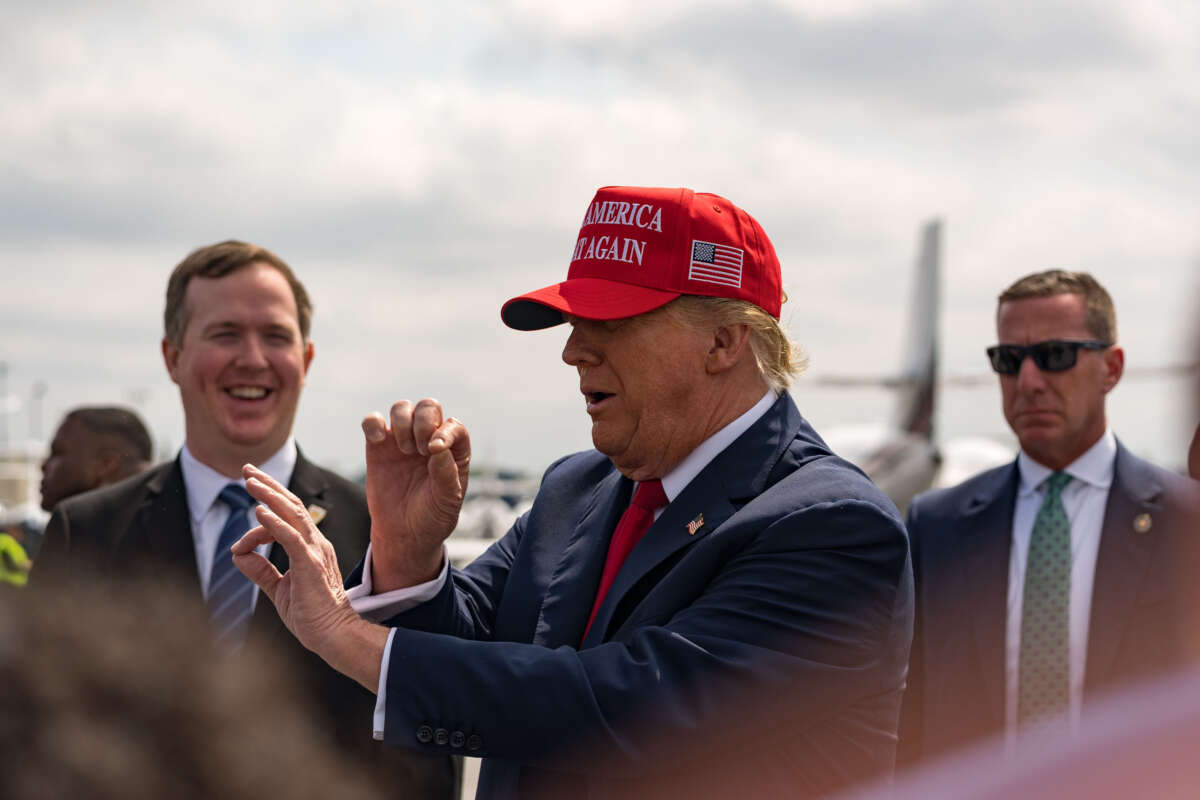During a recent speech at his Mar-a-Lago resort in Palm Beach, Florida, billed as a “Border 9/11 Gala,” former President Donald Trump pushed a number of outright lies regarding the 2024 presidential election, claiming, without evidence, that fraud would affect its outcome.
Trump’s comments echoed assertions he made in the run-up to the 2020 presidential election, which laid the groundwork for him to errantly claim that the election was illegitimate when he lost to President Joe Biden.
“We’re going to bring our country back. We’re going to get out there. We’re going to vote. We’re going to watch the cheating very carefully,” Trump said.
Trump, the presumptive nominee for the 2024 Republican nomination for president, also pushed the 2020 “Big Lie” during the event, saying that Biden’s campaign “took advantage of COVID last time” to win, and that Trump’s campaign wouldn’t allow something “like that [to] happen” this year.
Trump went on to say that his support was so monumental that the election could be canceled.
“I’ll tell you what, if it’s just by the vote, they could cancel that election. We win that election right now,” Trump said at the event.
In the same breath, he continued to push election fraud conspiracy theories: “We have so many more votes than they do, but we have to be very vigilant. We have to be very careful,” he said.
Trump has consistently used his followers’ willingness to accept falsehoods as truth to his political advantage. Some of his most recent, flagrantly false statements include:
- Claiming that Democrats support post-birth “execution” of babies;
- Saying that immigrants will take people’s Social Security benefits away;
- Stating that the Biden administration directed state-based investigations into Trump’s election interference in 2020;
- And continuing to claim that the 2020 presidential race “was a rigged election,” despite no evidence supporting such assertions.
Anti-Trump voices have become increasingly frustrated with the fact that Trump’s disinformation is so effective among his base, and that the media has failed to showcase to a large segment of society that he is constantly lying. Experts have noted that there are numerous strategies to combat such disinformation, and that some of the best options require a “long-game” approach.
Susan Stokes, a professor of political science at the University of Chicago, wrote in a Project Syndicate column last summer that repetition is an essential part of the equation.
“It helps to keep hammering away at the facts, and to appeal to voters’ capacity for critical thinking,” Stokes wrote. “Trump himself relies heavily on repetition, and Democrats should do the same, making clear again and again that his recklessness and self-centeredness have jeopardized national security and potentially exposed the American people to enormous harm.”
Christopher M. Richardson, an immigration lawyer and author, noted in a Los Angeles Times op-ed in February that Trump’s lies — particularly regarding the unrest he inspired on January 6, and his attempts to depict those who took part as “hostages” of the U.S. government — echo the revisionist history of the Civil War, commonly known as the Lost Cause movement. Looking to how Black Americans countered those narratives could be key to disrupting Trump’s falsehoods, Richardson says:
By the 1920s [the Lost Cause] was widely considered factual. But it drew pushback from a group of Black scholars who started what was then called Negro History Week, which grew into February’s Black History Month. Those educators had to combat one of our nation’s first campaigns of disinformation.
Although these scholars’ efforts were not 100 percent effective, the lies peddled by Lost Cause supporters “are not nearly as unchallenged as they were when Negro History Week started,” Richardson continued.
The strategy employed by these Black history scholars included teaching elementary school children factual accounts of history, as well as organizing older groups of people who were receptive to their message, including other historians and progressive media, so that accurate information was disseminated in “safe and educational environments.”
“That has some resonance today. Arguing on X/Twitter against MAGA zealots stuck in a new Lost Cause narrative can be of little to no use,” Richardson adds. “There may be more value in sharing knowledge of American democratic institutions…with young students and other open-minded or pro-democracy individuals. The endurance of Black History Month suggests that approach can build a lasting foundation for myth-busting education.”
Speaking to Truthout about how to combat Trump’s disinformation, Donald Nieman, a history professor at Binghamton University with an emphasis in U.S. law and politics, noted:
We need the fact-checkers, and we need the people who are challenging the lies, if only to inject sanity and seriousness into our political discourse. But what works better than trying to dispel Trump’s lies is to relentlessly point out that his positions on abortion, taxes, social security, climate change are deeply unpopular and/or benefit the rich at the expense of the middle class.
“Hammering away at his role in January 6 and the attacks on democracy and the police is another way to get the relatively few swing voters there are to understand what’s at stake,” Nieman added.
Stephanie Pappas, a freelance science journalist, stressed in Scientific American in April 2023 that trying to appeal to Trump loyalists’ logic or emotions doesn’t work. The best way to counter Trump-like conspiracy theorists, Pappas said, is through prevention (by “inoculating” people with information to counter falsehoods spouted by deceitful politicians before they became relevant) and education.
“Putting people into an analytic mindset and explicitly teaching them how to evaluate information appears most protective against conspiracy rabbit holes,” Pappas added.
